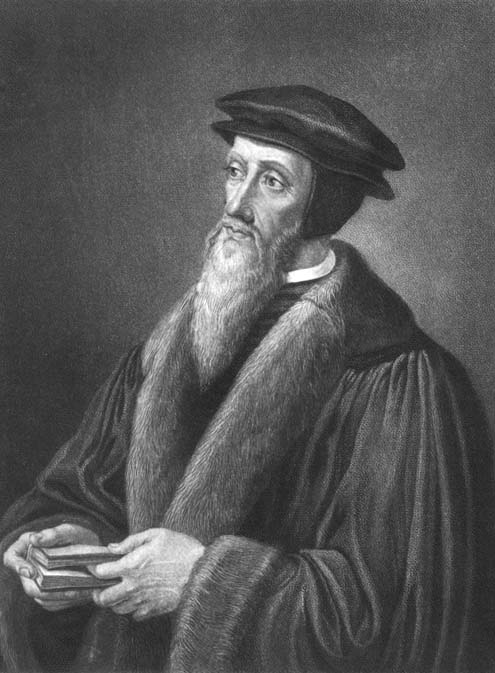Matthew 7:16-21; 10:22; 16:27

On 10-8-24, I published my article, Bible vs. “Faith Alone”: 100 Proofs (100 Bible Passages On Catholic Justification, Sanctification, and Faith + Works [from 22 out of 27 NT Books]: All Disproving Protestant “Faith Alone” Soteriology). Later, I got the idea of inquiring as to how John Calvin (1509-1564), one of the two the most influential founders of Protestantism, along with Martin Luther, would react to these passages in his Commentaries (and then offering my rebuttals). My approach here will be the same as in my book, The Catholic Verses: 95 Bible Passages That Confound Protestants (Aug. 2004). I explain my method in that book’s Introduction:
I shall now proceed to offer a critique of common Protestant attempts to ignore, explain away, rationalize, wish away, overpolemicize, minimize, de-emphasize, evade clear consequences of, or special plead with regard to “the Catholic Verses”: ninety-five biblical passages that provide the foundation for Catholicism’s most distinctive doctrines. . . .
I will assert – with all due respect and, I hope, with a minimum of “triumphalism” — the ultimate incoherence, inadequacy, inconsistency, or exegetical and theological implausibility of the Protestant interpretations, and will submit the Catholic views as exegetically and logically superior alternatives.
The dates of Calvin’s various Commentaries are as follows:
1540 Romans
1548 All the Epistles of Paul
1551 Hebrews, and the Epistles of Peter, John, Jude, and James
1551 Isaiah
1552 Acts of the Apostles
1554 Genesis
1557 Psalms
1557 Hosea
1559 Twelve Minor Prophets
1561 Daniel
1562 Joshua
1563 Harmony of Exodus, Leviticus, Numbers, and Deuteronomy
1563 Jeremiah
1563 Harmony of Three Gospels and Commentary on St John
I use RSV for biblical citations. Calvin’s words will be in blue.
A complete listing of this series will be on my web page, John Calvin: Catholic Appraisal, under the subtitle: “Bible vs. ‘Faith Alone’ vs. John Calvin”.
*****
Matthew 7:16, 18-21 You will know them by their fruits . . . [18] A sound tree cannot bear evil fruit, nor can a bad tree bear good fruit. [19] Every tree that does not bear good fruit is cut down and thrown into the fire. [20] Thus you will know them by their fruits. [21] Not every one who says to me, “Lord, Lord,” shall enter the kingdom of heaven, but he who does the will of my Father who is in heaven. . . .
Calvin pretty much misses the entire point of the passage, refuses to make specific comment on verses 18-21 (passes right over them) and instead decides to make his commentary an anti-Catholic rant:
If, for example, we place before our minds what Paul requires in bishops, (1 Timothy 3:1; Titus 1:6-9,) that description will be sufficient of itself to condemn the whole mass of Popery: for the Popish priests seem as if they purposely intended to present an opposite picture.
If one can’t provide a rational, sensible counter-reply, then one can always ignore! It’s the standard practice of Protestant apologists online, who only rarely engage in point-by-point dialogue with Catholic apologists. They are especially reluctant to do so in direct proportion to how much Scripture the Catholic offers in favor of their views and against the Protestant ones. Oh, the ironies . . .
Meanwhile, Jesus clearly, undeniably teaches here that works are one of the things that are absolutely essential to salvation, since the ones who don’t do them end up in hell (“fire”: following the agricultural analogies) and can’t go to heaven. I think this ought to have been directly addressed by Calvin, who was duty-bound to explain — to exhibit the courage of his convictions — how this can possible be squared with “faith alone.”
“Please Hit ‘Subscribe’”! If you have received benefit from this or any of my other 4,800+ articles, please follow my blog by signing up (with your email address) on the sidebar to the right (you may have to scroll down a bit), above where there is an icon bar, “Sign Me Up!”: to receive notice when I post a new blog article. This is the equivalent of subscribing to a YouTube channel. My blog was rated #1 for Christian sites by leading AI tool, ChatGPT: endorsed by influential Protestant blogger Adrian Warnock. Actually, I partner with Kenny Burchard on the YouTube channel, Catholic Bible Highlights. Please subscribe there, too! Please also consider following me on Twitter / X and purchasing one or more of my 55 books. All of this helps me get more exposure, and (however little!) more income for my full-time apologetics work. Thanks so much and happy reading!
***
Matthew 10:22 (cf. Mt 24:13; Mk 13:13) . . . But he who endures to the end will be saved.
Here, Calvin is brief. I cite his entire commentary:
This single promise ought sufficiently to support the minds of the godly, though the whole world should rise against them: for they are assured that the result will be prosperous and happy. If those who fight under earthly commanders, and are uncertain as to the issue of the battle, are carried forward even to death by steadiness of purpose, shall those who are certain of victory hesitate to abide by the cause of Christ to the very last?
It’s simply wrongheaded. This is not primarily a promise. Rather, it’s an exhortation to be vigilant. Nor is it an instance of assurance, for no one knows the future; hence, we don’t know with absolute certainly if we will endure to the end. St. Paul certainly exhibited no such faux-certainty, even about his own final state in the afterlife:
Philippians 3:10-14, 16 that I may know him and the power of his resurrection, and may share his sufferings, becoming like him in his death, [11] that if possible I may attain the resurrection from the dead. [12] Not that I have already obtained this or am already perfect; but I press on to make it my own, . . . [13] Brethren, I do not consider that I have made it my own; . . . [14] I press on toward the goal for the prize of the upward call of God in Christ Jesus. . . . [16] Only let us hold true to what we have attained.
Elsewhere, St. Paul is very clear and direct:
1 Corinthians 9:25-27 Every athlete exercises self-control in all things. They do it to receive a perishable wreath, but we an imperishable. [26] Well, I do not run aimlessly, I do not box as one beating the air; [27] but I pommel my body and subdue it, lest after preaching to others I myself should be disqualified.
1 Corinthians 10:12 Therefore let any one who thinks that he stands take heed lest he fall.
St. Peter casually assumes the possibility of falling away from grace and salvation. We don’t allow that to happen by engaging in numerous good works:
2 Peter 1:5-7, 10-11 For this very reason make every effort to supplement your faith with virtue, and virtue with knowledge, [6] and knowledge with self-control, and self-control with steadfastness, and steadfastness with godliness, [7] and godliness with brotherly affection, and brotherly affection with love. . . . [10] Therefore, brethren, be the more zealous to confirm your call and election, for if you do this you will never fall; [11] so there will be richly provided for you an entrance into the eternal kingdom of our Lord and Savior Jesus Christ.
Likewise, St. John:
2 John 1:8 Look to yourselves, that you may not lose what you have worked for, but may win a full reward.
In the context of the parallel verse in Matthew 24:13, Jesus taught:
Matthew 24:4-5 . . . “Take heed that no one leads you astray. [5] For many will come in my name, saying, ‘I am the Christ,’ and they will lead many astray.”
Why is He warning His disciples about a thing that supposedly can’t happen? Who knows? Calvin’s theology requires him to believe in the unbiblical notion of believers being eternally secure (irresistible grace). Similarly, Jesus stated:
Luke 21:8, 34-36 “Take heed that you are not led astray; . . . [34] But take heed to yourselves lest your hearts be weighed down with dissipation and drunkenness and cares of this life, and that day come upon you suddenly like a snare; [35] for it will come upon all who dwell upon the face of the whole earth. [36] But watch at all times, praying that you may have strength to escape all these things that will take place, and to stand before the Son of man.”
Again, Jesus says:
Revelation 2:5 Remember then from what you have fallen, repent and do the works you did at first. If not, I will come to you and remove your lampstand from its place, unless you repent.
In Revelation 2:10, Jesus says, “Be faithful unto death, and I will give you the crown of life.” It seems to me that if Calvin’s doctrine were true, He would have said something like, “you will be faithful unto death, at which time I will give you the crown of life.” But instead, the reward comes as a result of our faithful works and endurance. As always, it’s “both/and”: God’s grace enabling us to do good works, which He in turn rewards. But our works can’t be left out of it, as of no relevance whatsoever, and that’s what Calvin futilely attempts to do, because he is beholden to a false tradition of men, rather than to the Bible in this instance.
Matthew 16:27 For the Son of man is to come with his angels in the glory of his Father, and then he will repay every man for what he has done.
The reward of works has been treated by me as fully as was necessary under another passage.
The editor thinks that Calvin refers to his commentary on John 4:36. It’s a good verse that I could and should have included among my one hundred Bible proofs against “faith alone“. So let’s take a look at that:
John 4:36-38 He who reaps receives wages, and gathers fruit for eternal life, so that sower and reaper may rejoice together. [37] For here the saying holds true, ‘One sows and another reaps.’ [38] I sent you to reap that for which you did not labor; others have labored, and you have entered into their labor.”
How diligently we ought to devote ourselves to the work of God, he proves by another argument; namely, because a large and most excellent reward is reserved for our labor; for he promises that there will be fruit, and fruit not corruptible or fading.
Yes, and it is rewards for our work, including “for eternal life.” This is the whole point, and key to Protestant-Catholic soteriological disagreements.
And certainly both considerations ought greatly to encourage the ministers of the word, that they may never sink under the toil, when they hear that a crown of glory is prepared for them in heaven, and know that the fruit of their harvest will not only be precious in the sight of God, but will also be eternal.
This is better. Calvin virtually stumbles upon the Catholic view, almost despite himself. The fruit and the reward are “eternal.” I don’t see how that is essentially different from saying that “good works help bring about eternal life, along with grace and faith.” If B is a reward for A, then by the same token, we can also say that A (partially or wholly) caused B.
It is for this purpose that Scripture everywhere mentions reward, and not for the purpose of leading us to judge from it as to the merits of works; for which of us, if we come to a reckoning, will not be found more worthy of being punished for slothfulness than of being rewarded for diligence?
Note how Calvin takes a swipe at merit (and the God-enabled good works that bring it about), but that’s abundantly proven in Scripture as well. He offers no immediate Scriptures to justify his hostility to merit. I provide fifty that establish it beyond any doubt.
To the best laborers nothing else will be left than to approach to God in all humility to implore forgiveness.
That’s easy to say, but it’s not what the Bible teaches. It regularly asserts that works are one of the three things (along with grace and faith) directly involved in the causation of salvation.
But the Lord, who acts towards us with the kindness of a father, in order to correct our sloth, and to encourage us who would otherwise be dismayed, deigns to bestow upon us an undeserved reward.
But again, it’s deserved in terms of our having truly earned the reward by our works. That’s not just me making a bald claim (as Calvin often does); it’s at least a hundred Bible passages saying so. I didn’t write the Bible or determine my theology; I simply follow it wherever it leads me. It’s why there are many passages in the Bible in which a person (prominently, St. Paul) is “proud” about his work for God, and boasts about it. This sense of deserving reward would make no sense whatever if merit weren’t true, and if Calvin’s “faith alone” was true doctrine.
This is so far from overturning justification by faith that it rather confirms it. For, in the first place, how comes it that God finds in us any thing to reward, but because He has bestowed it upon us by his Spirit?
Yes, He rewards His own gifts, as St. Augustine noted. It doesn’t follow, however, that we did nothing, or that we get no credit. “Both/and.” God makes our works His. Both things are true. I provided seven Bible passages proving that in my previous installment (see especially 1 Cor 15:10, 58 and Phil 2:12-13).
Secondly, how comes it that God confers so great honor on imperfect and sinful works but because, after having by free grace reconciled us to himself, He accepts our works without any regard to merit, by not imputing the sins which cleave to them?
This is not an argument; it’s a false assumption. The Bible never teaches that every single work is imperfect and sinful, nor that God supposedly doesn’t impute these “sins” that “cleave” to them: as Calvin mistakenly believes. God thinks they are altogether good enough to not only receive merit but also to help bring about salvation. I have brought forth 150 Bible passages to prove it. I need not keep citing them. Readers may follow the links. And we are going through many of those now, in the effort to reveal how pitifully Calvin tries to systematically — and unsuccessfully — skirt around them. Sadly, it’s what almost all Protestant apologists have done for over 500 years, when it comes to actually grappling with Catholic biblical arguments (which they avoid like the plague but occasionally descend to trying to refute).
But, in order that this passage may be properly understood, we must comprehend the contrast between sowing and reaping The sowing was the doctrine of the Law and the Prophets; for at that time the seed thrown into the soil remained, as it were, in the blade; but the doctrine of the Gospel, which brings men to proper maturity, is on that account justly compared to the harvest. For the Law was very far from that perfection which has at length been exhibited to us in Christ.
This lame defense of faith alone might have worked (at least prima facie), except that the Bible contradicts it, by placing sowing and reaping together:
1 Corinthians 9:9-11 For it is written in the law of Moses, “You shall not muzzle an ox when it is treading out the grain.” Is it for oxen that God is concerned? [10] Does he not speak entirely for our sake? It was written for our sake, because the plowman should plow in hope and the thresher thresh in hope of a share in the crop. [11] If we have sown spiritual good among you, is it too much if we reap your material benefits?
2 Corinthians 9:6, 10 The point is this: he who sows sparingly will also reap sparingly, and he who sows bountifully will also reap bountifully. . . . [10] He who supplies seed to the sower and bread for food will supply and multiply your resources and increase the harvest of your righteousness.
Galatians 6:7-8 Do not be deceived; God is not mocked, for whatever a man sows, that he will also reap. [8] For he who sows to his own flesh will from the flesh reap corruption; but he who sows to the Spirit will from the Spirit reap eternal life.
God doesn’t denigrate sowing, by equating it with antiquated law, as Calvin does; especially in these words:
as that seed was degenerated from the very root, and as the corn which could spring from it, though not good or natural, was choked by a huge mass of errors, it is unreasonable to suppose that such destructive corruption is compared to sowing
Now I return to Calvin’s commentary on Matthew 16:27:
When a reward is promised to good works, their merit is not contrasted with the justification which is freely bestowed on us through faith; nor is it pointed out as the cause of our salvation, but is only held out to excite believers to aim at doing what is right, by assuring them that their labor will not be lost.
If that were indeed true, then Calvin would and should have refuted all of these “Catholic verses” that I produce: showing exactly why and how they don’t refute faith alone (and provide us with many other verses that uphold that novel doctrine). But as we see, he doesn’t come within a million miles of doing so.
God, of his own good pleasure, bestows on our works a reward which we did not deserve.
The Bible says that they are worthy. That’s why Paul stated that he was “proud” of his own works, and boasted about them, and boasted about works of his followers, too. If we want to find the notion of works “deserving” reward, we can find that, too:
Matthew 10:10 . . . the laborer deserves his food.
Luke 10:7 . . . the laborer deserves his wages . . .
These two passages refer to the disciples going out and evangelizing and performing miracles.
1 Timothy 5:18 for the scripture says, “You shall not muzzle an ox when it is treading out the grain,” and, “The laborer deserves his wages.”
Revelation 2:23 . . . I will give to each of you as your works deserve.
Scripture knows nothing of the false doctrine of every good work inevitably being tainted by sin and corruption. God gives rewards that we have merited and deserve. Calvin gets it exactly backwards.
*
*
*
***
*
Photo credit: John Calvin: unknown 16th century portrait [public domain / Wikimedia Commons]
Summary: One of a series examining how John Calvin (1509-1564) exegeted biblical passages in his Commentaries that (in my opinion) refute the novel Protestant doctrine of “faith alone”.













